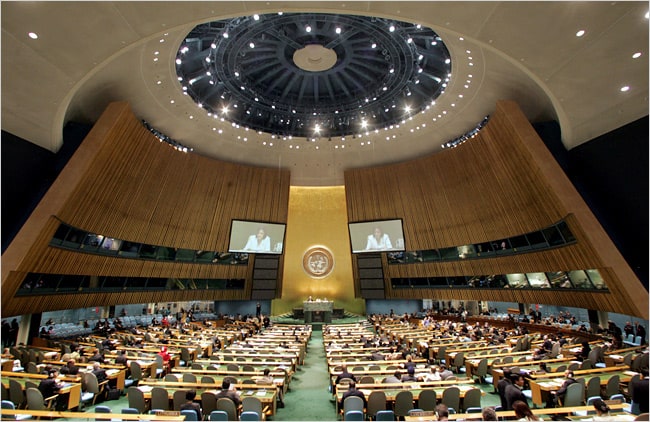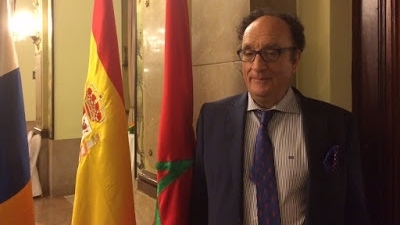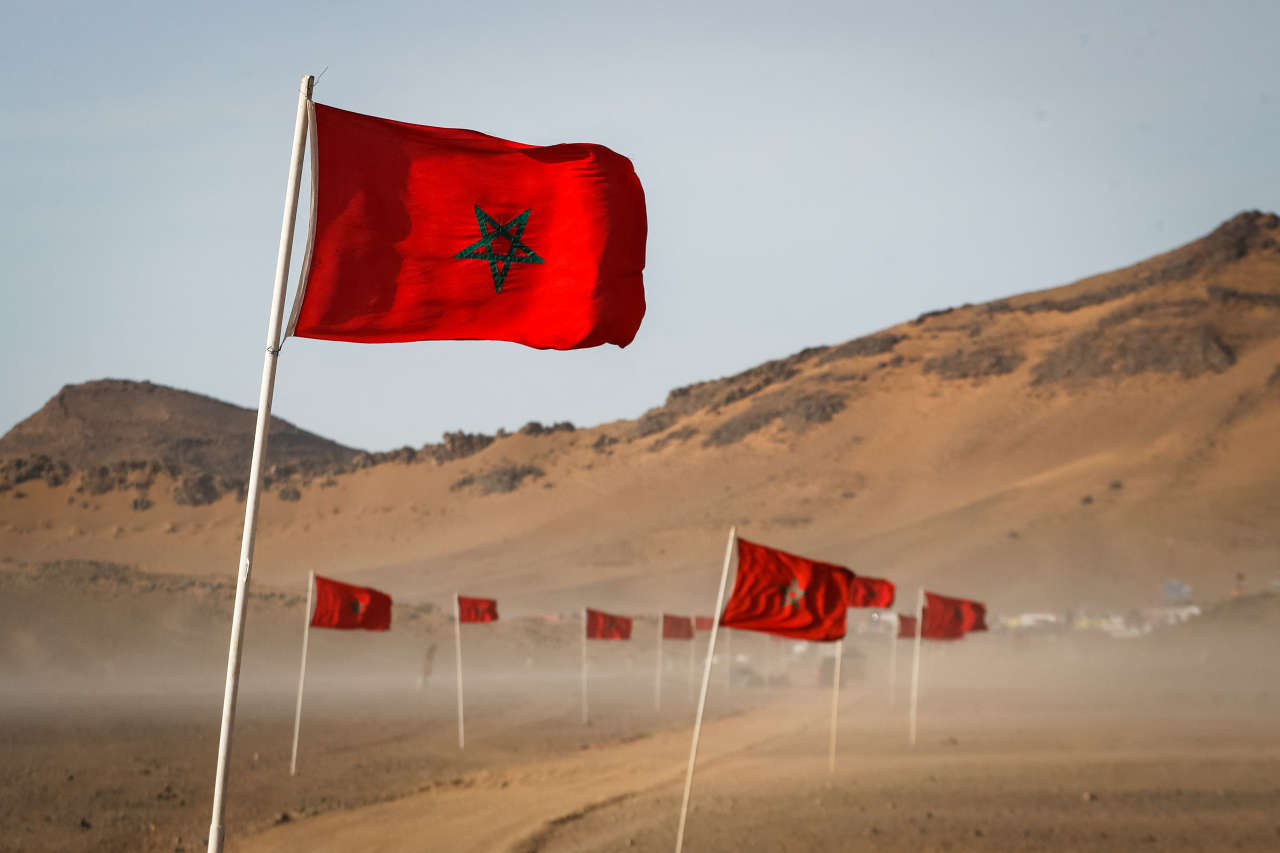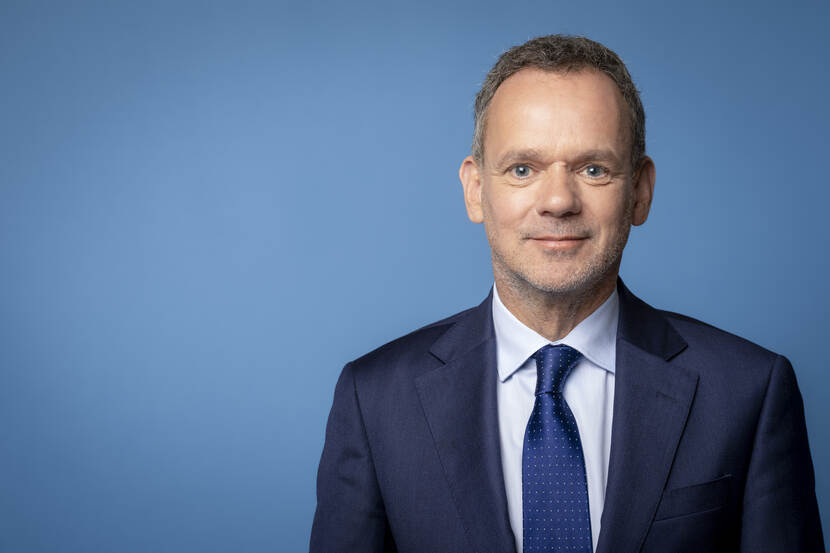More international law experts, university professors and human rights militants continue to support, at the United Nations, Morocco’s realistic autonomy plan for the Sahara and denounce the sufferings endured by the sequestered Sahrawis in the Polisario-controlled Tindouf camps, Southern Algeria.
Addressing the UN fourth Committee, convening in New York, French expert André Grimblatt said that Morocco’s autonomy proposal is credible, sustainable and the only viable & realistic solution which is gaining a growing international support.
He also denounced the polisario use of children soldiers in violation of international law and diversion of international humanitarian aid destined for the sequestered Saharwis in the Tindouf camps.
Roberto Leon Ramirez, Head of Fundación Global Chile Marruecos, recalled his visits to Tindouf wherein he saw serious human rights violations in the camps.
Algeria controls free movement and “does not allow in other countries”, he said, affirming that some of the humanitarian aids are re-sold on the black market in the south of Algeria. He highlighted the plight of women in the camps, adding that not even children are exempt from the worst kind of physical and psychological violence.
For professor Juan De Dios Gutierrez, international law at the National Autonomous University of Mexico, since 1945, sixty territorial conflicts have been resolved peacefully based on the principle of autonomy.
He described the autonomy plan proposed by Morocco for the Sahara as a compromise pursuant to international agreements, the United Nations Charter, General Assembly and Security Council resolutions, saying all parties to the conflict must commit to the UN-sponsored round table process to achieve political solution.
El Fadel Bua Da Mohamed of the Association Sahraouie contre l’Impunité dans les Camps de Tindouf (ASIMCAT) recounted his experience as a refugee and human rights defender who was abducted for five months and lived in secret detention centers under the watch of Algerian generals.
The Sahrawis are being used by the Polisario leaders to serve their personal interest and agenda of the Algerian regime which arms, funds and shelters the armed militias.
For her part, Lemaadla Mohamed Salem Zrug, (ASIMCAT), said that women in the Tindouf camps are routinely subjected to human trafficking and forced marriage.
Her father was abducted and tortured to death by Polisario, she said, noting that rapes have occurred in the camps and the Polisario leader is currently sued in Spain for rape.
Mohammed Ahmed Gain of the African Institute for Peacebuilding and Conflict Transformation described the Tindouf camps as a goldmine for separatist movements, with its geographic position in a strategic corridor encouraging the recruitment of terrorists, the smuggling of drugs and weapons, human trafficking and the protection of war criminals.
“Africa opposes the creation of microstates,” said Coulibaly Youssouf of the Université de Bamako in Mali, adding that African capitals all agree that only a political settlement would provide a lasting solution, citing in this regard Morocco’s autonomy proposed for the Sahara under its sovereignty.
He also called on the United Nations to include the Polisario and other armed groups in northern Mali and the Sahel on its list of terrorist organizations.
Grace Njapau, Women Investment Network (WIN), said the Security Council has been clear since 2001 that a referendum is no longer an option, adding that the Moroccan autonomy initiative is gaining more support around the world.
The Sahara has a vibrant civil society with 8,000 organizations registered in the region. She condemned the Polisario ill-treatment of women and children in the camps, which remain “an open-air prison”. She called for a quick resolution of the regional dispute, underscoring that Morocco’s proposed solution based on autonomy is the only one that corresponds to parameters set forth by the Council.
Pedro Diaz de La Vega Garcia, Banco de Alimentos, said the Moroccan Sahara used to be one of the poorest areas in Morocco, but now it has one of the country’s highest rates of development. Morocco is investing greatly in the Sahara in a bid to turn it into a transatlantic cooperation hub.
Mohamed Ziyad Aljabar, member of the Palestinian-Moroccan Friendship Society, said that Morocco’s autonomy plan for the Sahara is a good basis for negotiations, affirming that it is the only feasible and realistic solution.
The Polisario armed militias continue to threaten the security of the buffer zone, in violation of Security Council resolutions, he said, adding that the question of the Moroccan Sahara is not similar to that of Palestine.
Mohamed Edabadda, Association Rotary International à Boujdour, said that in the “south of the Kingdom” important initiatives have led to constructive projects that cover all aspects of life, especially sustainable development, social justice and civil rights.
Different civil society organizations in the south enjoy a great responsibility and play their role in evaluating all democratic practices, he added.
Bahi Larbi Ennass, Centre la Paix pour les Études Politiques et Stratégiques, said he used to be a military leader in the Polisiario and witnessed the serious human rights violations committed in the Tindouf camps.
Abdul Basith Pattinathar from World Humanitarian Drive said women in the Tindouf camps are deprived of their fundamental rights and are victims of sexual aggression by polisario gangs.
Civil society militant M’Rabih Adda said he was expelled from the Tindouf camps by the polisario leaders after undergoing the worst forms of torture for exercising his freedom of expression and requesting an identity card as a refugee.
For his part, Hammada El Baihi, member of the Sahara League for Democracy & Human Rights, said that everyone in the Tindouf camps has been suffering from a catastrophic situation for decades, denouncing the systematic theft of international aid donated for the inhabitants of the Tindouf camps.
Khalid Bendriss, Association Supporting Moroccan Autonomy Plan, highlighted the infrastructural development in the southern provinces, noting that the level of socioeconomic growth in that region has been internationally recognized, including by the United Nations.
Moroccan Sahara has two airports, 10,000 km of roads and one of the biggest ports in the country, he said, adding that the Moroccan Government has improved the quality of life of the local populace through schools, libraries and hospitals.



